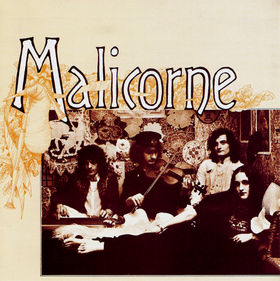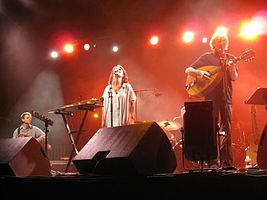
Indochine is a French rock and new wave band formed in Paris in 1981. They became very successful in the Francophonie, Europe and Latin America in the 1980s, with songs like "L'Aventurier" and "Canary Bay". Following the release of several critically acclaimed, but commercially unsuccessful, albums in the 1990s, the group returned to stardom with the release of Paradize in 2002. The band has sold over 13 million albums and singles.
Beau Dommage was a rock band from Montreal, Quebec, who achieved success in Quebec and France in the 1970s. The group's style included rich vocal harmonies and elements borrowed from folk and country music.

Dan Ar Braz is a Breton guitarist-singer-composer and the founder of L'Héritage des Celtes, a 50-piece Pan-Celt band. Leading guitarist in Celtic music, he recorded as a soloist and with Celtic harp player Alan Stivell. He represented France in the Eurovision Song Contest 1996.

Gabriel Yacoub is a French musician, songwriter and visual artist.

Téléphone was a French rock band formed in 1976. Their first, self-titled album was released in 1977; by the end of the decade they were one of the biggest French rock bands in the world, opening shows for The Rolling Stones in Paris, Quebec, the United States and Japan. The band split in 1986 for personal reasons. They have sold around 10 million albums to date, a record still unbeaten for a French rock band.

Daniel Xavier-Marie Balavoine was a French singer and songwriter. He was hugely popular in the French-speaking world in the early 1980s; he inspired many singers of his generation such as Jean-Jacques Goldman, Michel Berger, who was his closest friend, as well as the Japanese pop-rock group Crystal King. Balavoine was a part of the original cast of the rock opera Starmania in 1978, which was written by Berger.
Harmonium was a Quebec progressive rock band formed in 1972 in Montreal. It became one of the most well-known music bands in the province of Québec in the 1970s and continues to hold an iconic and influential status to this day.

Vox Dei is an Argentine rock band credited for recording the country's first concept album, La Biblia. Their most prolific years were the 1970s, when they recorded ten albums.

The Musical Box are a Canadian tribute band formed in Montreal, Quebec in 1993 who recreate performances by the English rock band Genesis during the 1970s. The current line-up is formed of singer and performer Denis Gagné, guitarist François Gagnon, bassist Sébastien Lamothe, keyboardist Ian Benhamou, and drummer Marc Laflamme.

Claudine Luypaerts, better known as Maurane, was a Francophone Belgian singer and actress.
Taxi Girl were a French new wave band, adopting the New Romantic aesthetics of the time, such as clashing red and black clothing, synthesizer-led songs, and taking influence from mythology and literature. The group existed between 1978 and 1986, producing 5 mini-albums, and one full-length album, Seppuku. Their early success is attributed to two singles, "Mannequin" in 1979 and "Cherchez le garçon" in 1980.

Almanach is an album by Malicorne, released in 1976 on the Grffin label. As before, it has a complex sound. The arrival of Hughes de Courson has given the album a more classical feel.

Malicorne is an album by Malicorne. It is sometimes referred to as Nous sommes chanteurs de sornettes because the album is simply called "Malicorne" and "Nous sommes chanteurs de sornettes" is the first track.

Malicorne is the second studio album by Malicorne, released in November 1975 on the Hexagone label and distributed by WEA. It is sometimes referred to as Le Mariage anglais because the album is simply called "Malicorne" and "Le Mariage anglais" is the first track.

Etron Fou Leloublan, also known as EFL, were a French avant-garde rock band founded in 1973 by actor and saxophonist Chris Chanet. They recorded five studio albums between 1976 and 1985, and released a live album, En Public Aux Etats-Unis d'Amérique recorded during a tour of the United States in 1979. Etron Fou Leloublan were best known as one of the five original Rock in Opposition (RIO) bands that performed at the first RIO festival in London in March 1978.

Malicorne is the debut studio album by Malicorne, released in October 1974. It is sometimes referred to as Colin because the album is simply called "Malicorne" and because "Colin" is the first track.
Garolou is a Canadian progressive and folk-rock group. Formed in 1975 by French Canadians from Ontario and Quebec, the band was originally called Lougarou, but had to change its name after being sued by a dance troupe named Les Loups-garous. The group became popular not only in Quebec but across Canada, with its rock sound and its lyrics taken from French and French Canadian traditional songs.

Red Cardell is a French, Breton rock band, that mixes Breton music with rock, folk, blues, world music and chanson réaliste.

New Celeste are a folk rock band from Scotland, originally formed in 1975, releasing seven albums over five decades, the most recent in 2016.

Kadril is a Belgian folk group formed in 1976 from the then youth and nature movement Wielewaaljongeren. The group name refers to the salon dance Quadrille, transliterated into Flemish as Kwadril or Kadril.


















